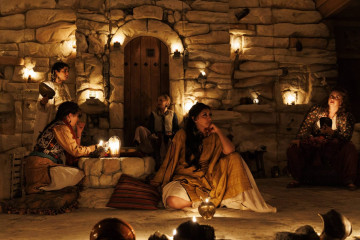
Sarah Shaffi
15 December, 2022
As a new production offers a fresh, feminist take on 1,001 Nights, writer Hannah Khalil talks about the show and how it’s offering a new view of Arab women.
What do you think of when you hear the phrase ‘Arabian Nights’? Aladdin and his magic carpet will almost certainly spring to mind. Perhaps Ali Baba and his thieves. At a push, you might think about the storyteller behind it all, Sheherazade.
It’s likely that whatever you do think of has a Western lens on it, and is possibly shaped by Disney or the very British tradition of pantomime.
"It's a woman who wins, a woman who's allowed to win eventually. And we rarely get that”
The versions you’ve seen or heard or read will either sideline women or sexualise and exoticise them, and whatever you’ve consumed will be much less dark than the original.
It’s likely that whatever you do think of has a Western lens on it, and is possibly shaped by Disney or the very British tradition of pantomime.
"It's a woman who wins, a woman who's allowed to win eventually. And we rarely get that”
The versions you’ve seen or heard or read will either sideline women or sexualise and exoticise them, and whatever you’ve consumed will be much less dark than the original.
RELATEDCultureRosie McCabe
Now, all those versions of the Arabian Nights, or 1,001 Nights as it is sometimes also called, are set to be challenged by Hakawatis, a new play at the Sam Wanamaker Playhouse, written by Hannah Khalil, who is looking to reclaim the stories for women, and Arab women in particular.
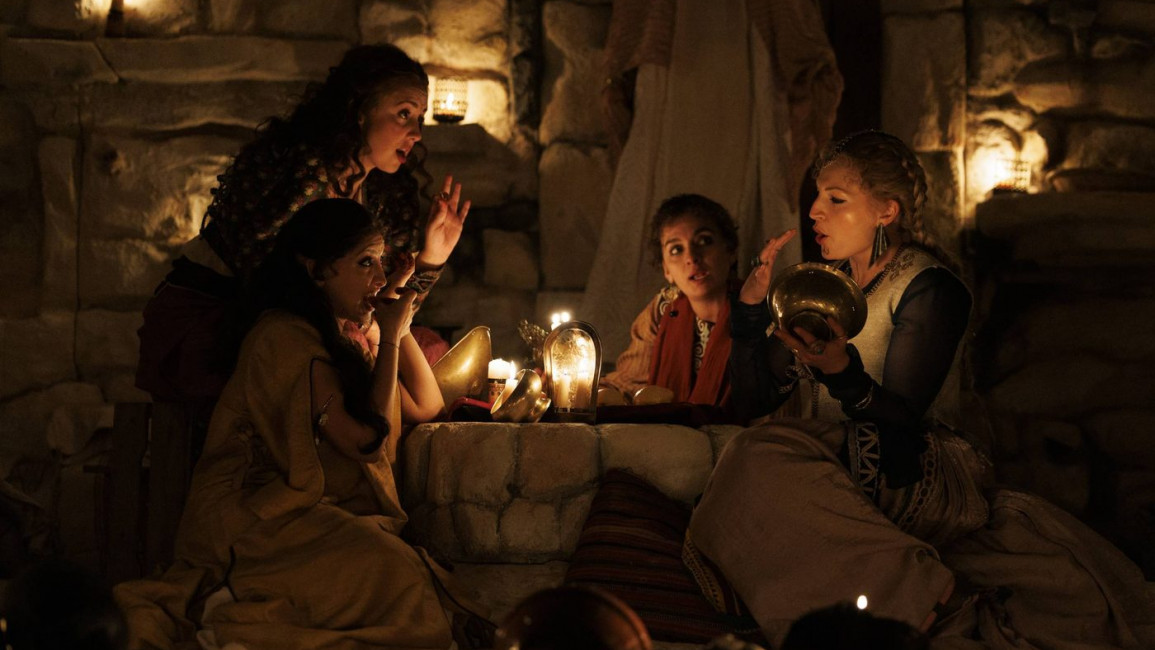
Houda Echouafni as Wadiha, Roann McCloskey as Naha,
Nadi Kemp-Sayfi as Akila, and Laura Hanna as Zuya
“I think the framing structure of Arabian Nights is incredibly feminist because she [Sheherazade] saves her life and everyone else's by telling stories,” Hannah tells The New Arab. “It's a woman who wins, a woman who's allowed to win eventually. And we rarely get that.”
Hakawatis is a corrective to that, centring not just one, but five women: Fatah the Young (played by Alaa Habib), Akila the Writer (Nadi Kemp-Sayfi), Zuya the Warrior (Laura Hanna), Wadiha the Dancer (Houda Echouafni) and Naha the Wise (Roann Hassani McCloskey).
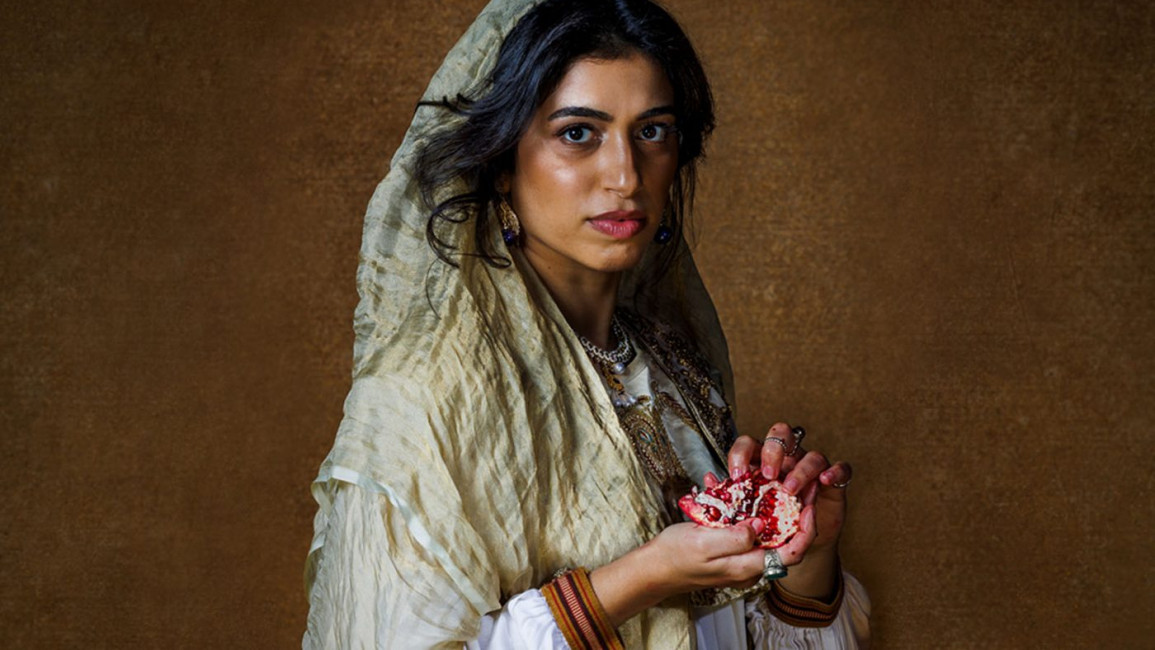
“I think the framing structure of Arabian Nights is incredibly feminist because she [Sheherazade] saves her life and everyone else's by telling stories,” Hannah tells The New Arab. “It's a woman who wins, a woman who's allowed to win eventually. And we rarely get that.”
Hakawatis is a corrective to that, centring not just one, but five women: Fatah the Young (played by Alaa Habib), Akila the Writer (Nadi Kemp-Sayfi), Zuya the Warrior (Laura Hanna), Wadiha the Dancer (Houda Echouafni) and Naha the Wise (Roann Hassani McCloskey).

Alaa Habib as Fatah the Young
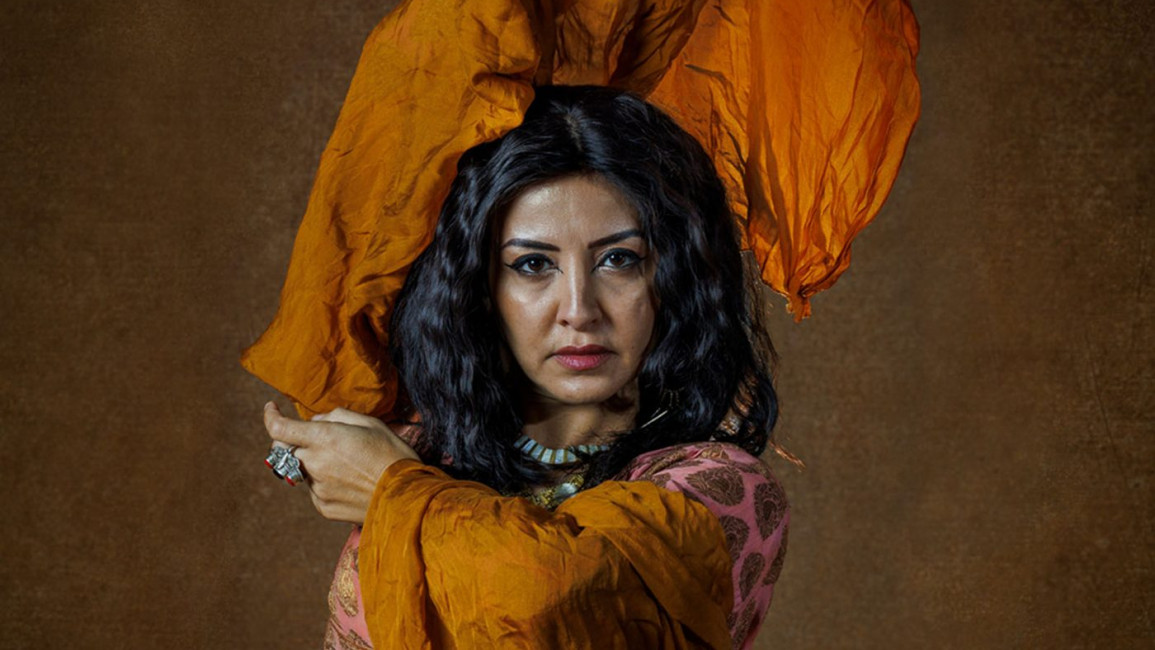

Houda Echouafni as Wadiha the Dancer
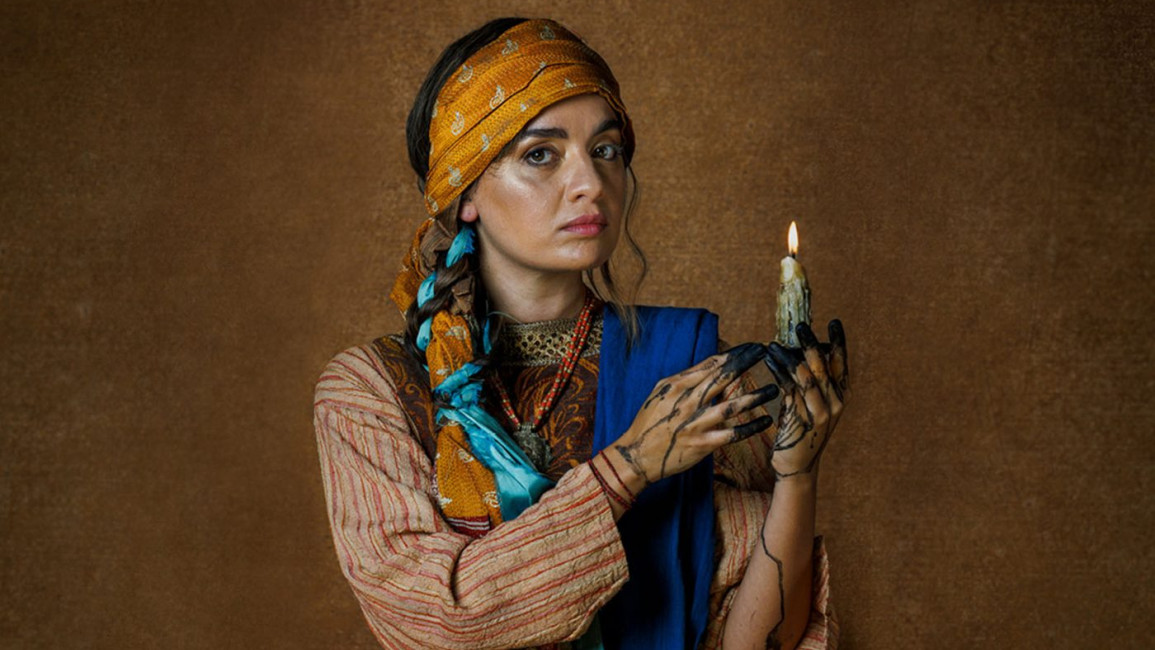

Nadi Kemp-Sayfi as Akila the Writer
After deciding on five parts, Hannah said she wanted to have them as “different facets, sort of archetypes”.
“But there is a world in which you could read this play and say those five women are all Sheherazade,” she says.
Having “always been frustrated with the parts that are available for global majority actors, but specifically Arab women”, Hannah has spent much of her career “trying to create roles that are more diverse and interesting and three-dimensional Arab women”.
The other thing she’s often done in her work is create stories within stories; the Arabian Nights is, of course, one of the ultimate examples of stories within a story, with all its tales framed by the larger story of Sheherazade fighting for survival.
The idea for Hakawatis came to Hannah slowly, then all in a rush. She had seen two productions at the Lyceum in Edinburgh which were adaptations of 1,001 Nights; the first was the Tim Supple-directed One Thousand and One Nights, with stories adapted by Hanan al-Shaykh, and the other was a production for children called Arabian Nights, written by Suhayla El-Bushra.
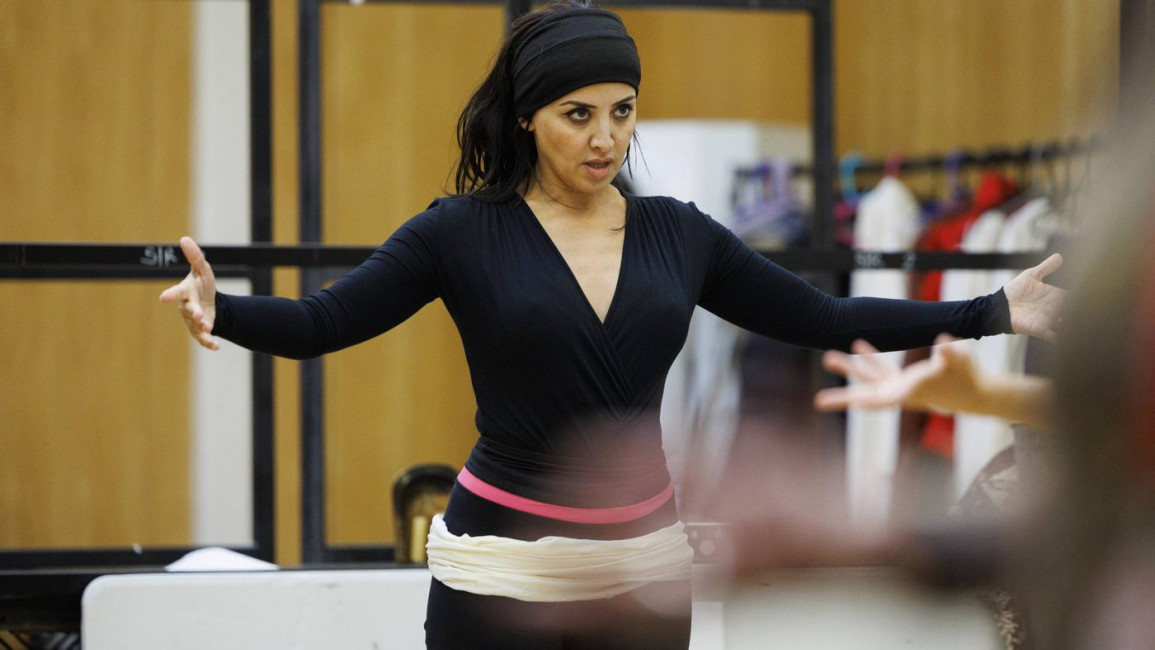
“But there is a world in which you could read this play and say those five women are all Sheherazade,” she says.
Having “always been frustrated with the parts that are available for global majority actors, but specifically Arab women”, Hannah has spent much of her career “trying to create roles that are more diverse and interesting and three-dimensional Arab women”.
The other thing she’s often done in her work is create stories within stories; the Arabian Nights is, of course, one of the ultimate examples of stories within a story, with all its tales framed by the larger story of Sheherazade fighting for survival.
The idea for Hakawatis came to Hannah slowly, then all in a rush. She had seen two productions at the Lyceum in Edinburgh which were adaptations of 1,001 Nights; the first was the Tim Supple-directed One Thousand and One Nights, with stories adapted by Hanan al-Shaykh, and the other was a production for children called Arabian Nights, written by Suhayla El-Bushra.

Hakawatis Rehearsal Photos taken on 11 November 2022
[Shakespeares Globe]
And then she went to see Lions and Tigers by Tanika Gupta at the Sam Wanamaker Playhouse, and “fell in love” with the theatre space, which is lit by one hundred beeswax candles and is created in the tradition of the candlelit theatres of Shakespeare’s time.
“I think all of those things sort of crystallised in my head as I was walking home along the Thames to the station,” she tells The New Arab. “I thought ‘oh' and that's how I had this idea. So I think it's like all of those things were sitting in different bits of my brain and they all just crystallised having seen that beautiful play and that beautiful space.”
And so Hakawatis came into being, directed by Pooja Ghai, who directed that production of Lions and Tigers that Hannah watched.
Pooja is the artistic director of the theatre company Tamasha; Hakawatis is a co-production with Tamasha.
The play features eight stories in total. Four are from the original 1,001 Nights, with Hannah wanting to use stories people had most likely never heard before, “because there’s only a few used” regularly.
She thought she would read the whole of 1,001 Nights, but “failed because it’s so bloody long”. “But I sort of would start a story and be like, no, not this one,” she says. In the end, she settled on The Fisherman and the Djinn, The Wolf and the Fox, The King and the Sage and The Sparrow and the Eagle.
The fifth story is an adaptation that Hannah, who is of Palestinian and Irish descent, has done of an old Palestinian folktale. The final three are original new stories, specially commissioned by Hannah from al-Shaykh and El-Bushra – the two women whose plays she had seen that helped inspire her story – and Sara Shaarawi.
And then she went to see Lions and Tigers by Tanika Gupta at the Sam Wanamaker Playhouse, and “fell in love” with the theatre space, which is lit by one hundred beeswax candles and is created in the tradition of the candlelit theatres of Shakespeare’s time.
“I think all of those things sort of crystallised in my head as I was walking home along the Thames to the station,” she tells The New Arab. “I thought ‘oh' and that's how I had this idea. So I think it's like all of those things were sitting in different bits of my brain and they all just crystallised having seen that beautiful play and that beautiful space.”
And so Hakawatis came into being, directed by Pooja Ghai, who directed that production of Lions and Tigers that Hannah watched.
Pooja is the artistic director of the theatre company Tamasha; Hakawatis is a co-production with Tamasha.
The play features eight stories in total. Four are from the original 1,001 Nights, with Hannah wanting to use stories people had most likely never heard before, “because there’s only a few used” regularly.
She thought she would read the whole of 1,001 Nights, but “failed because it’s so bloody long”. “But I sort of would start a story and be like, no, not this one,” she says. In the end, she settled on The Fisherman and the Djinn, The Wolf and the Fox, The King and the Sage and The Sparrow and the Eagle.
The fifth story is an adaptation that Hannah, who is of Palestinian and Irish descent, has done of an old Palestinian folktale. The final three are original new stories, specially commissioned by Hannah from al-Shaykh and El-Bushra – the two women whose plays she had seen that helped inspire her story – and Sara Shaarawi.
Their inclusion speaks again to Hannah’s love of stories within stories.
RELATEDCultureTariq Raouf
“I thought, wouldn't it be amazing if we could have some new stories, and wouldn't it be amazing if I could get other Arab women writers to write those?” says Hannah. “And then we've got a situation where the way it's made, the way it's written, mirrors what's happening in the play.”
The play explores, says Hannah, “different notions of storytelling”, perhaps unsurprising for anyone who speaks Arabic and knows that ‘hakawati’ means ‘storyteller’.
The play is exploring the “idea of storytelling written down, which is a very Western form of storytelling,” says Hannah. “And storytelling as in the spoken, the oral tradition, which is obviously much more from the MENA region.”
“If you've got one idea of what you think an Arab woman looks like, you need to bin it”
In a call-out to that oral tradition, every telling of The Fisherman and the Djinn during the play’s run will be unique. “So The Fisherman and the Djinn story is written on the page,” says Hannah, “but it says every night the actors are to improvise this live. It's like an offer to the actors to do it for real.”
Her actors, and the roles they play, are partly how Hannah is looking to push back against people’s stereotypes of Arab women. She wanted to make sure “that all these women are composites of other women I know so that they're truthful”.
RELATEDCultureNilosree Biswas
That truth means that Hakawatis, Hannah says, “won't be for everybody”.
“There'll be some people who feel like it's maybe a little bit too racy or something,” she continues. All the women on stage are “strong, beautiful, ferocious women,” says Hannah, adding: “If you've got one idea of what you think an Arab woman looks like, you need to bin it.”
Hakawatis is at the Sam Wanamaker Playhouse until January 14
Sarah Shaffi is a freelance literary journalist and editor. She writes about books for Stylist Magazine online and is the books editor at Phoenix Magazine.
Follow her here: @sarahshaffi
Photos by Ellie Kurttz
No comments:
Post a Comment